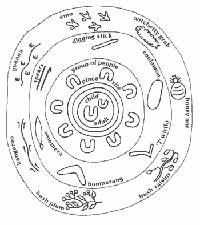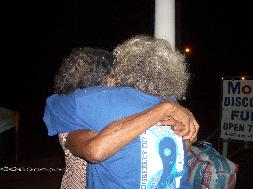 |
| Ancient Wisdom Passed Through Aboriginal Sacred Circles |
|
|
In ancient Native American tradition, circles were formed for healing from the heart. A 'talking stick' was passed and held by the brave person who had a burning desire to share feelings from the heart - with no blame, shame, or fear placed on that person by the group. This type of sharing, using sentences that begin with 'I feel…', help the person talking and others in the circle learn effective communications, thus healing the speaker and the listeners. A culture group can select any object that they hold sacred or special for the group to pass. Deborah Dupre'
"Circles Of Compassion" and "Family Healing Circle" facilitation and training ensures First Nation communities and families have opportunity to experience sustainable community capacity building for better cater of those suffering. This includes self-assessment, self-support and greater understanding of emotional wounds and the healing process.
|
Abstract
Dupre’, Deborah. (2004) Testing effectiveness of Aboriginal appropriate Community Based Rehabilitation Pre-treatment, Family Structured Intervention (FSI) to empower Indigenous families to succeed in respectfully guiding resisting Alcohol Dependent loved ones to rehabilitation – before hitting bottom.
Most AOD rehabilitation programs require addicted people to ask for help. Most with Addiction cannot ask for help because of Denial and Delusion, therefore never receive treatment and continue harming self and others. Most people want to help loved ones with Addiction get help but do not have all skills needed to succeed. Throughout Australia, Aborigines consistently ask for interventions that heal affected loved ones, their families and community. In shear exasperation from a problem out of control, like many non-Indigenous use “Tough-love,” some Indigenous communities use banishment interventions, turning unwanted tribal members into a caste of "walking dead." In 2003, the Alcohol Education and Rehabilitation Foundation funded Deborah Dupre's Community Based Rehabilitation pre-treatment research based on Dr. Vernon Johnson's FSI, Dr. Walter Scanlon’s supporting research, Dupre’s 14 years of FSI research and development with Indigenous U.S., Australian and Ni-Vanuatu clients. It tested effectiveness of a culturally appropriate FSI version, “Family Healing Circles” in Halls Creek, WA with four Aboriginal families negatively affected by a resisting family member’s Alcohol Dependency. Tests proved the pre-treatment effective in "giving power back" to the community to effectively support each other to rehabilitate. It created a domino effect. In three weeks, 16 adults and youth with Alcohol Dependency registered for rehabilitation with nine at-risk children accompanying them. Family Healing Circle pre-treatment works and is a basic human right.
|
 |
| Gratitude After Family Healing Circle in Remote Australia Outback Aboriginal Community |
|
| Family Healing Circles
Family Healing Circles are the Aboriginal culturally appropriate Family Structured Intervention (FSI) founded by Deborah Dupre’ based on her community participatory research and development in Australia with its First Nation People.
FSI was founded by researcher Dr. Vernon Johnson and further researched and proven effective by Dr. Walter Scanlon. Dupre's Family Healing Circles took the process another step to safely, gently, respectfully and rapidly guide Aboriginal people harming self and others with alcohol and other drug misuse to willingly commit to detoxify.
How Family Healing Circles Work
Clients’ mentor and family-based team are formed and scheduled for Family Healing Circles (FHC). Each FHC family-based "team" participates in 2 informal Family Healing Circle Learning Activities held in sacred spaces facilitated by Deborah Dupre'. These activities equip the team with skills to ensure their effective support of their client.
Following the family learning activities, the team leader and Dupre', known as the "Family Healer," invites their loved one to the circle. Together the group with their loved one at the Family Healing Circle apply newly learned and practiced culturally appropriate Family Structured Intervention techniques.
In this compassionate setting, the client sees reality of their harmful behaviour, the loving support to change, and subsequently commits to culturally appropriate detoxification.
"Training of Trainers"
Dupre' also facilitates First Nation Family Healing Circle learning programs with local Chiefs and Elders so that they have opportunities to learn the "Family Healing" skills. The program is, therefore, locally sustainable.
|
New Role for Traditional Healing
By Elder Dennis Thorne
Edmonton, Alberta
11 June 1992
We believe that traditional cultures can — and should — act as a kind of source book of ideas for reconceptualizing and reorganizing Aboriginal health and social services. It is not a very big step from there to recognizing that traditional healers can (and should) play a significant part in redesigned care systems.
A number of thoughtful speakers argued that traditional healing methods and therapies can make two sorts of contribution: they are valuable in their own right for their direct efficacy in treatment, and they contain ideas that can be adapted to solve difficult problems in restoring whole health to Aboriginal people. The attitude of these speakers was not revivalism but inquiry into the past. They spoke of applying old practices to new problems, of combining them with western therapies in a spirit of experimentation and learning.
The majority of traditional healers were forced long ago to renounce their practices (or to practise covertly) because of persecution by Canadian governments and Christian churches and contempt on the part of bio-medical practitioners for their ceremonies, herbal treatments and other therapies. Newcomers’ disrespect was eventually mirrored in the feelings of most Aboriginal people themselves. Yet, traditional practices never faded away completely. In the Peguis First Nation, they are playing an increasingly important part in medical services (see box).
Only a few healers came forward to speak to the Commission. They told us of the ancient power of their traditions and of the interest in their work that is growing all over the country:
It is with great concern that I present this brief for the protection and preservation of our traditional and spiritual beliefs and culture. The inherent right to practise our traditional beliefs was given to us when the Creator first put the red man here on earth….In times of great difficulty, the Creator sent sacred gifts to the people from the spirit world to help them survive. This is how we got our sacred pipe, songs, ceremonies and different forms of government. These were used for the good health, happiness, help and understanding for the red nation….[Each tribe] had our own sacred traditions of how to look after and use medicines from the plant, winged and animal kingdoms. The law of use is sacred to traditional people today….
By the 1960s, traditional spiritual people were almost extinct except for those who went underground. A lot of our traditional spiritual elders went to their graves with much knowledge. Since then there has been a rebirth….[Even non-Aboriginal people] are coming to traditional spiritual people for help….The present health care system is in a crisis and heading for financial collapse unless there are alternatives. Traditional spiritual people want to create alternatives for all people to get help.
|
|
|